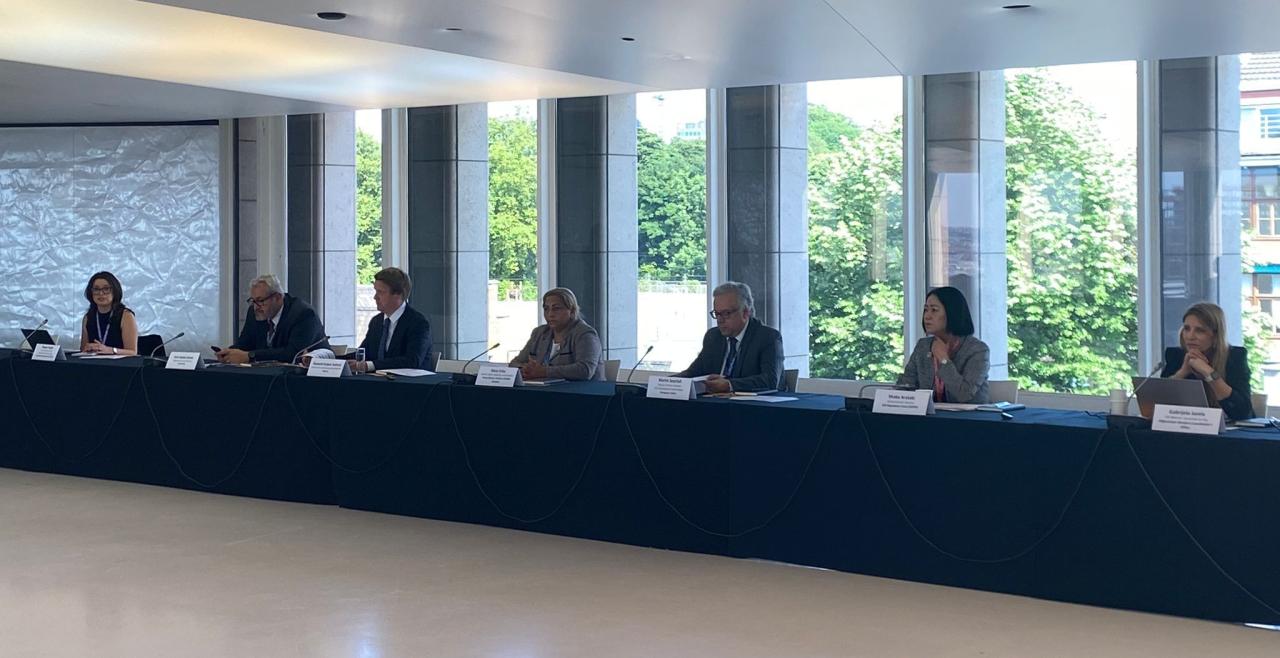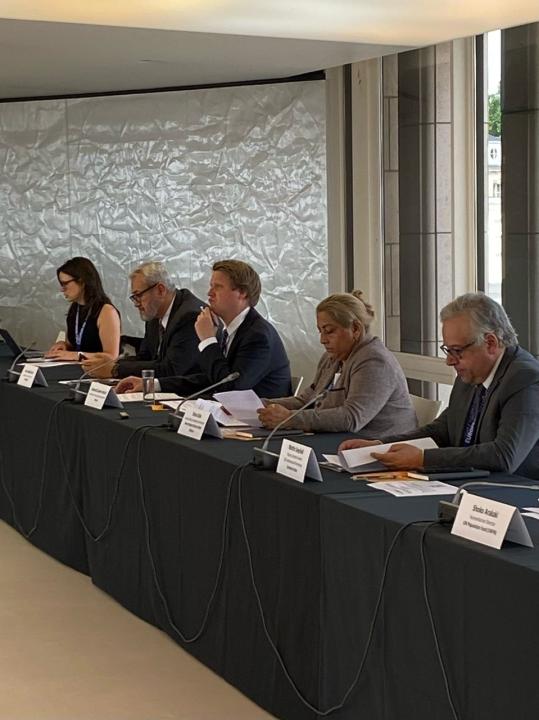Meeting the moment: Promoting long-term investment in ending violence against women and girls in fragile settings on the sidelines of the European Humanitarian Forum

BRUSSELS, Belgium – On May 19, Spotlight Initiative hosted an event on the sidelines of the European Humanitarian Forum titled ‘Meeting the Moment: Investment in Long-Term Programming to Address Violence Against Women and Girls in Fragile Contexts’. The event aimed to share best practices and drive collaboration between humanitarian and development actors working in humanitarian settings.
Panellists included:
- Minister for International Development for Norway, Åsmund Grøver Aukrust;
- Deputy Director General at the Directorate-General for International Partnerships with the EU, Martin Seychell;
- UNFPA Humanitarian Director, Shoko Arakaki;
- Gender Coordinator, Afghanistan Resident Coordinator’s Office, Gabrijela Jurela;
- World Bank Afghanistan Country Director, Faris Hadad-Zervos;
- Human Rights Defender and President of Roma Women Platform ROMNI in Moldova, Elena Sîrbu;
- Megan Daigle, Senior Research Fellow, Humanitarian Policy Group, Overseas Development Institute (Moderator)
In her opening remarks, Ms. Daigle commented on the current state of humanitarian funding: “We’re seeing reductions in international assistance by growing numbers of governments. These cuts will push humanitarian donors to narrow their offering and their funding to those interventions they deem to be life-saving. This definition doesn’t tend to include combating gender-based violence (GBV).”
“Fragile contexts account for 23 per cent of the world’s population but 73 per cent of people living in extreme poverty,” said Ms. Daigle. “Women, girls and other marginalized groups, especially those facing multiple forms of marginalization experience the most dire outcomes.”
Minister of International Development for Norway Mr. Aukrust on the importance of Spotlight Initiative in addressing VAWG.
Minister of International Development for Norway, Mr. Aukrust, reiterated the need for Norway and its partners to step up and fill the gaps in a context of increasing cuts to funding and backlash to women’s rights.
“These issues are an increasing problem on the ground where there are more sexual and gender-based violence [cases] in some of the worst conflicts we are facing right now,” he said. Mr. Aukrust related visiting refugee camps in Chad, where women and girls fleeing conflict in Sudan shared stories of experiencing sexual violence during the conflict, on their way to the refugee camp and within camps themselves. He noted that sexual violence had been used in other global conflicts and the need for “cross country and cross-regional work between politicians, NGOs, UN agencies and World Bank” to address the increased need.
Human rights defender and President of the Roma Women Platform Romni in Moldova, Ms. Sîrbu, said that decreasing funding risked forcing a narrow understanding of life-saving assistance, creating dangerous gaps in comprehensive programming.
“As a grassroots organization, I know very well how important it is to continue focusing on ending violence,” said Ms. Sîrbu. “We must maintain investment in women and girls’ protection, ensuring complementarity between humanitarian and development financing tools to ensure sufficient resources for ending violence against women and girls.” She noted that Roma women were especially vulnerable due to multiple layers of discrimination and exclusion, and that funding cuts would mean closing essential services such as shelters, legal aid clinics, literacy and job training programmes.
Humanitarian Director of UNFPA, Ms. Arakaki, highlighted women and girls’ urgent sexual and reproductive health needs, including post-rape care, in humanitarian settings.
“Pregnancy and childbirth don’t stop during crises… Evidence is very clear: more than 60 per cent of maternal mortality and over 70 per cent of gender-based violence happens in humanitarian and fragile settings,” said Ms. Araki. “In 2025, it is estimated that 92 million individuals will need a GBV prevention response service and 11 million pregnant women will require humanitarian aid.”
Ms. Araki said that recent funding cuts had severely impacted the Agency’s ability to deliver in fragile settings, with programme closures leaving women and girls without medical care after rape, access to HIV treatment and safe spaces away from perpetrators.
Gender Coordinator, Afghanistan Resident Coordinator’s Office, Ms. Jurela focused on the challenges of addressing GBV in a country where gender-based discrimination has been institutionalized.
“Even before the Taliban, the statistics were harrowing,” said Ms. Jurela. “Every second woman between the ages of 15 and 49 has experienced physical or sexual violence in her lifetime. In some provinces, that figure was 90 per cent.” She said that the abolition of national frameworks to end GBV means that the only support for women experiencing violence in the country comes from the UN and international non-government organizations and civil society organizations.
World Bank Country Director for Afghanistan, Faris Hadad-Zervos, said addressing GBV is “good development” and that data shows that addressing GBV makes countries more resilient when facing fragility, conflict and violence.
“We’ve been addressing [violence] through direct intervention in GBV services. In health, for instance, 20,000 global health workers have been trained in GBV prevention and referral but also specialized training to doctors to be able to sensitize them on recognizing and addressing [GBV],” said Mr. Hadad-Zevros. He stressed the need to “see women and [survivors] of GBV as frontline warriors… rather than being victims” and said that the World Bank focuses on identifying economic opportunities for Afghan women.
Deputy Director General at the Directorate-General for International Partnerships with the European Union, Martin Seychell, highlighted the EU’s historic investments in ending GBV, including through Spotlight Initiative.
“The European Union has championed and continues to champion global efforts to prevent and eliminate all forms of gender-based violence, including in fragile and conflict-affected settings,” said Mr. Seychell. “Our flagship initiative is Spotlight Initiative, which was launched back in 2017 with an initial EU contribution of 500 million Euros. By now, Spotlight Initiative has become a tried and tested model and has shown measurable success in reducing violence and empowering survivors and it is one of the 12 UN High-Impact Initiatives.”
We are confident that the conversations held in this side event will continue and translate into concrete contributions to address VAWG in fragile settings. In this moment of resource scarcity, women and girls need the support more than ever.

